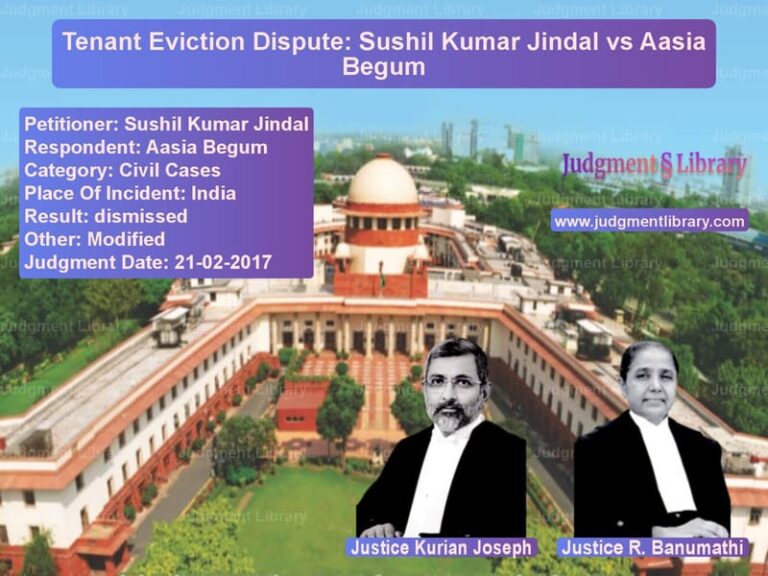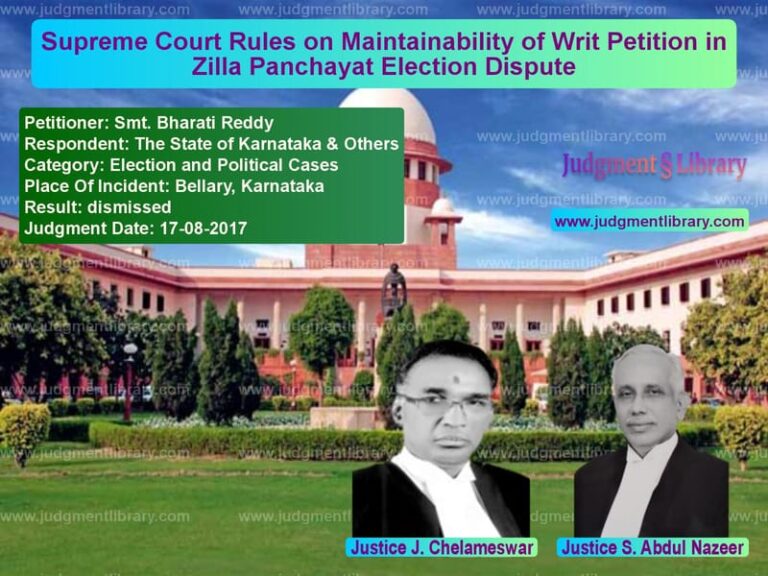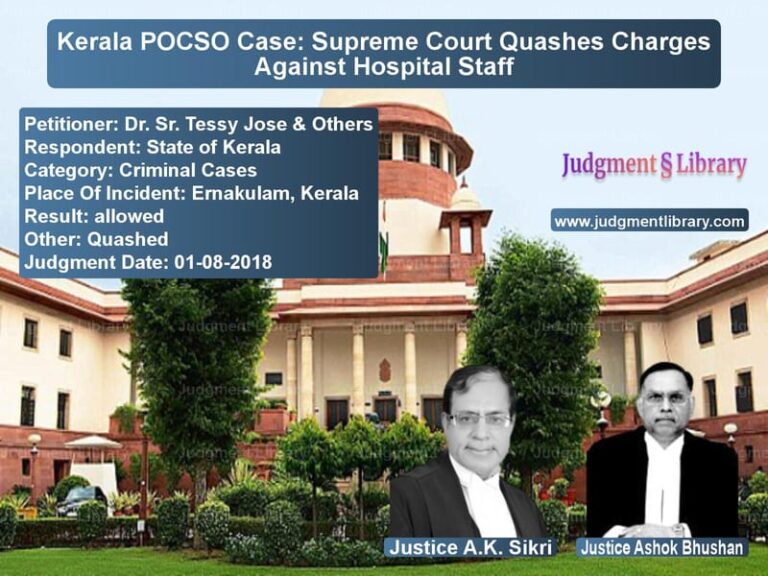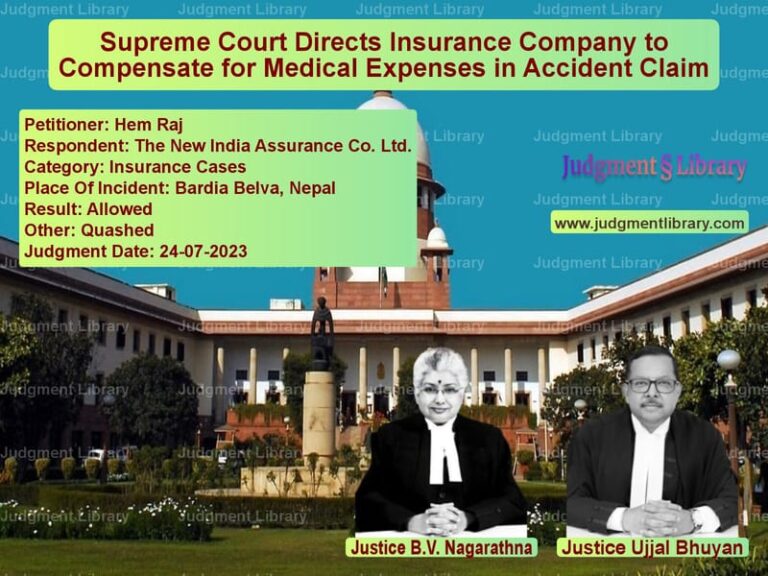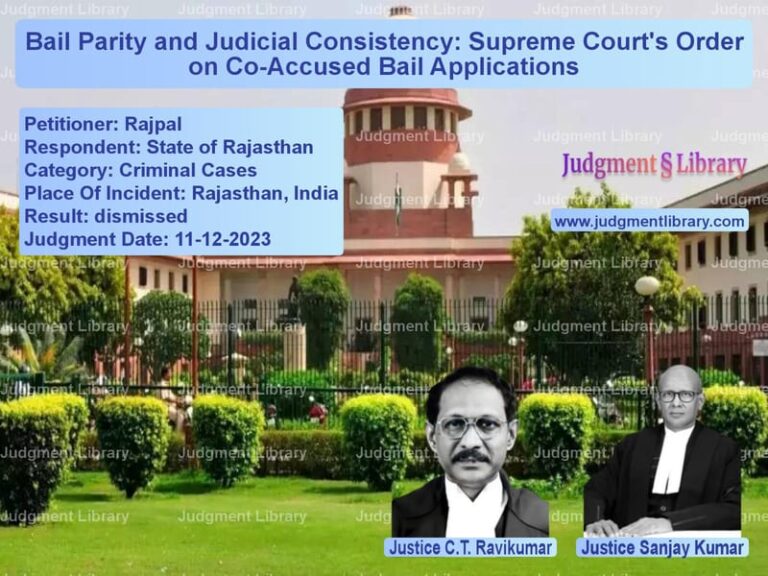Customs Duty and Personal Effects: Supreme Court Upholds High Court’s Decision
The case of Directorate of Revenue Intelligence & Ors. vs. Pushpa Lekhumal Tolani pertains to the confiscation of gold and diamond jewelry under the Customs Act, 1962. The Supreme Court had to determine whether the jewelry carried by the respondent was dutiable and whether the High Court rightly quashed the show-cause notice and ordered the return of seized goods.
Background of the Case
The respondent, Ms. Pushpa Lekhumal Tolani, arrived at the IGI Airport, New Delhi, from London on November 19, 2002. Acting on a tip-off, officers of the Directorate of Revenue Intelligence (DRI) intercepted her while she was passing through the Green Channel. Upon searching her luggage under Section 102 of the Customs Act, 1962, the officials found 44 pieces of jewelry worth Rs. 1.27 crores.
She was immediately taken into custody and remained in judicial custody until November 26, 2002. Subsequently, a show-cause notice was issued to her on December 12, 2002, asking why the jewelry should not be confiscated under the Customs Act. On August 14, 2003, the competent authority passed an order:
- Confiscating new articles valued at Rs. 86,52,765.
- Confiscating seized jewelry worth Rs. 40,47,235 with an option of redeeming it upon paying a fine of Rs. 3,00,000.
- Imposing a penalty of Rs. 15,00,000.
In a parallel criminal case, the Additional Chief Metropolitan Magistrate found the respondent guilty under Sections 132 and 135(1)(a) of the Customs Act and sentenced her to imprisonment for the period already undergone and imposed a fine of Rs. 6,00,000.
Legal Issues
The Supreme Court examined the following legal issues:
- Whether the seized jewelry constituted “personal effects” under the Baggage Rules, 1998.
- Whether the High Court correctly quashed the show-cause notice and ordered the return of the jewelry.
- Whether the respondent’s failure to declare the goods warranted confiscation.
Arguments by the Appellant (Directorate of Revenue Intelligence)
The appellant, represented by the Solicitor General, contended:
- The seized jewelry included items that could not be classified as personal effects under the Baggage Rules, such as men’s accessories (tie pins, tie clips, and metal collars).
- The respondent had not made a true and correct declaration of the items.
- The jewelry was newly purchased, evident from invoices, and was not for immediate personal use.
- The respondent had claimed a VAT refund in London, which indicated that she intended to import the goods into India permanently rather than re-export them.
Arguments by the Respondent (Pushpa Lekhumal Tolani)
The respondent’s counsel countered:
- Under Rule 7 of the Baggage Rules, 1998, tourists are allowed to bring “used personal effects” free of duty if they are meant for their personal use and re-export.
- The jewelry was for personal use and intended to be taken out of India, making it non-dutiable.
- The claim of VAT refund in London did not prohibit her from taking the goods back.
- The High Court correctly concluded that the jewelry was personal effects and was not subject to customs duty.
Supreme Court Judgment
The Supreme Court ruled in favor of the respondent, upholding the High Court’s decision. The key observations made by the Court were:
- The respondent did not violate Section 77 of the Customs Act, as Green Channel declarations are implicit and intended to facilitate passenger clearance.
- The jewelry fell within the definition of “used personal effects” as per Rule 7 of the Baggage Rules, 1998.
- The import of gold and diamond jewelry for personal use was permissible under the EXIM policy at the time.
- The respondent’s return to London after collecting the seized goods did not support the prosecution’s claim that she had intended to permanently import the jewelry into India.
Observations of the Supreme Court
The Court stated:
“The respondent was not carrying dutiable goods because the jewelry was bona fide for her personal use and was intended to be taken out of India. Bringing jewelry into India for taking it out later is permissible and is not liable to any import duty.”
Additionally, the Court ruled:
“The presumption that jewelry found in baggage cannot be considered as personal effects due to its high monetary value is incorrect. Travelers may purchase personal effects before embarking on a journey, and newness alone cannot disqualify them as personal effects.”
Conclusion
The Supreme Court’s ruling clarifies that personal jewelry intended for re-export is exempt from customs duty under the Baggage Rules. The judgment underscores:
- The importance of interpreting baggage rules in light of passenger rights and international travel norms.
- The necessity of ensuring customs procedures do not unfairly penalize travelers carrying bona fide personal effects.
- The role of courts in preventing excessive enforcement actions by customs authorities.
This decision sets a precedent for future disputes involving personal effects and customs declarations, ensuring fairness in passenger clearance procedures.
Don’t miss out on the full details! Download the complete judgment in PDF format below and gain valuable insights instantly!
Download Judgment: Directorate of Reven vs Pushpa Lekhumal Tola Supreme Court of India Judgment Dated 18-08-2017.pdf
Direct Downlaod Judgment: Direct downlaod this Judgment
See all petitions in Tax Refund Disputes
See all petitions in Banking Regulations
See all petitions in Consumer Rights
See all petitions in Judgment by R K Agrawal
See all petitions in Judgment by Prafulla C. Pant
See all petitions in dismissed
See all petitions in supreme court of India judgments August 2017
See all petitions in 2017 judgments
See all posts in Taxation and Financial Cases Category
See all allowed petitions in Taxation and Financial Cases Category
See all Dismissed petitions in Taxation and Financial Cases Category
See all partially allowed petitions in Taxation and Financial Cases Category


